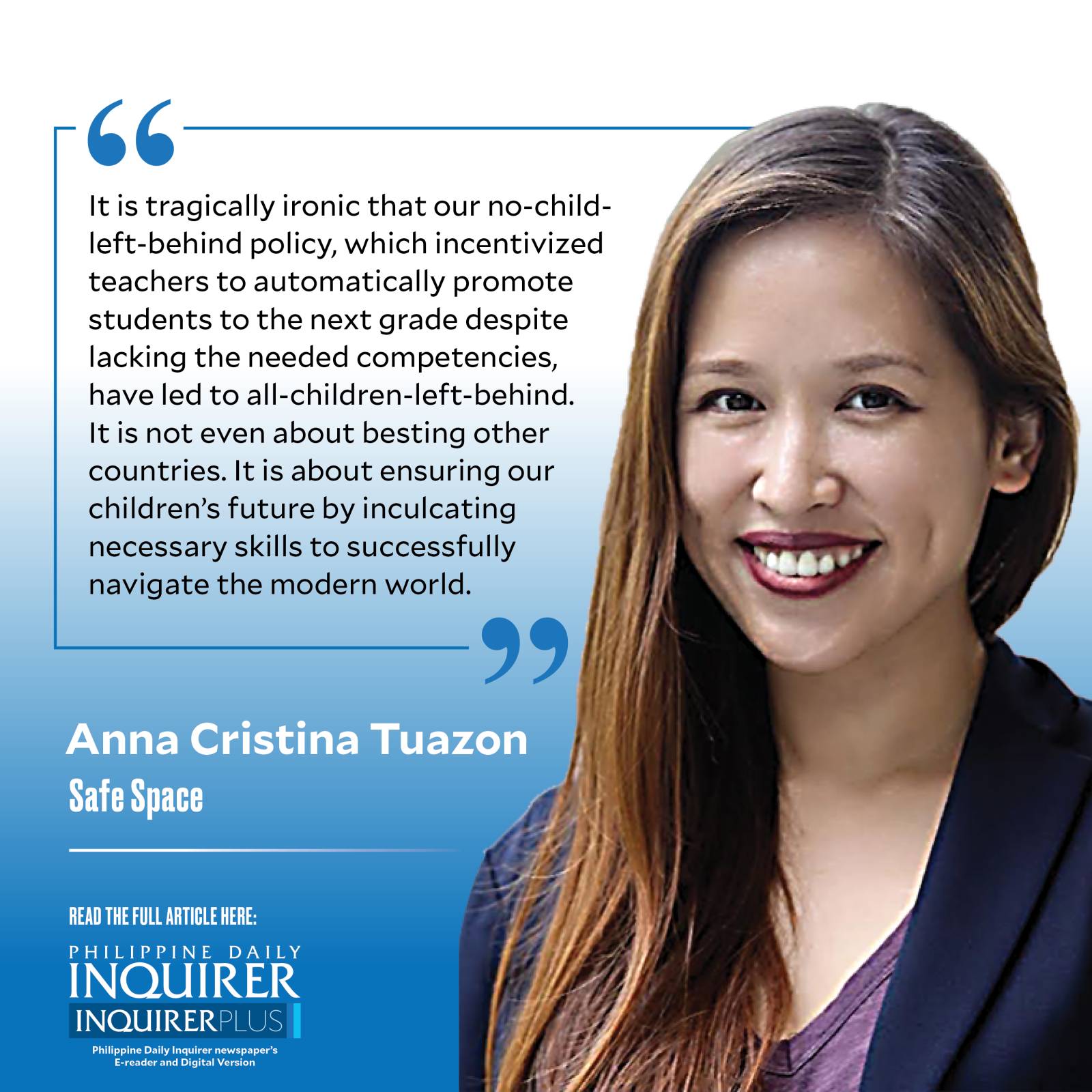Filipino students left behind

The 2022 Programme for International Students Assessment (PISA) rankings are out. Have we become so desensitized to dismal news in the education front that we are no longer surprised that we have performed poorly? The PISA is a global assessment conducted by the Organization for Economic Cooperation and Development every three years across more than 80 countries. In 2018, our students ranked lowest in reading and second lowest in both mathematics and science. While we gained a few ranks in the recently published 2022 PISA, coming at sixth to last in both reading and mathematics and third to last in science, our absolute performance has remained roughly the same. More disturbing is the fact that only 16 to 24 percent of our tested students reached the minimum level of proficiency in each of these subjects, falling far below the global average.
I am already anticipating defensive reactions such as using the COVID-19 pandemic to explain our performance. While we cannot ignore the enormity of the pandemic, we must recognize that our response to educational concerns during that time only made things worse. Top-down demands and a one-size-fits-all approach, especially as it pertained to online learning, had blocked out significant sectors from being able to receive education. I also anticipate some will cling to the small increase in ranking as a sign of progress, despite our students’ objective score remaining roughly the same as in 2018. This only means that some countries performed more poorly, but it does not necessarily mean that we improved.
Article continues after this advertisementSo, then, how do we make sense of these findings? More importantly, how do we learn from it?
The most crucial fact: a vast majority of our students do not reach minimum proficiency for reading, mathematics, and science. It is tragically ironic that our no-child-left-behind policy, which incentivized teachers to automatically promote students to the next grade despite lacking the needed competencies, have led to all-children-left-behind. It is not even about besting other countries. It is about ensuring our children’s future by inculcating necessary skills to successfully navigate the modern world.
Reading, mathematics, and science are not esoteric subjects. Look at what “minimum proficiency” means in the PISA. In reading, it is the ability to identify the main idea in a text of moderate length. It is also the ability to find information, even using complex criteria. In mathematics, it is the ability to interpret and recognize how to mathematically represent a situation. In science, it is the ability to recognize correct explanations for scientific phenomena and using such knowledge to identify whether a conclusion is valid based on data. Taking these three subjects together, they are essential means to understand—and verify—information around us. What happens when we lose proficiency in these areas? Being unable to understand and critique the messages we receive means that we can become vulnerable to fake news and scams. It also means we are easy targets for disinformation and manipulation.
Article continues after this advertisementThe diverted focus of the Department of Education (DepEd) toward Reserve Officers’ Training Corps, rewording of historical events, and removal and integration of subjects without any pedagogical basis has allowed our students to pass from grade to grade without having learned the essential things. These international assessment results should have jolted DepEd awake toward the state of our education instead of getting swayed by the temperamental winds of national politics.
It is time for best practices to take center stage in our education reform. Education should be led by actual educators. We need to focus on pedagogy—the how’s of teaching—rather than focusing solely on content. We need to encourage and incentivize innovation rather than a bureaucracy-led approach that constrains and micromanages teachers. Nobody knows the students better than the teachers themselves. Teachers do best when given academic freedom and leeway to adapt and innovate based on their students’ context.
We have a fundamental accessibility issue when it comes to education. We are not even talking about what can or cannot be posted on classroom walls. Our problem goes deeper than that. Some students literally cannot reach school. Build roads and bridges to schools. Better yet, bring schools closer to students in far-flung areas. Increase access to electricity and internet, the most basic of infrastructure needed for modern education.
Students are limited by what teachers know. It is time to bring back quality master teachers who can mentor and upgrade teaching standards. On top of a congress-led reform, the profession of teachers should be given resources to oversee its own overhaul. It is time for a somber and nondefensive reflection on the quality of teaching in this country and what can be done to improve it. Filipino students are getting left behind. It is time to give them a boost.
—————-
aatuazon@up.edu.ph
















